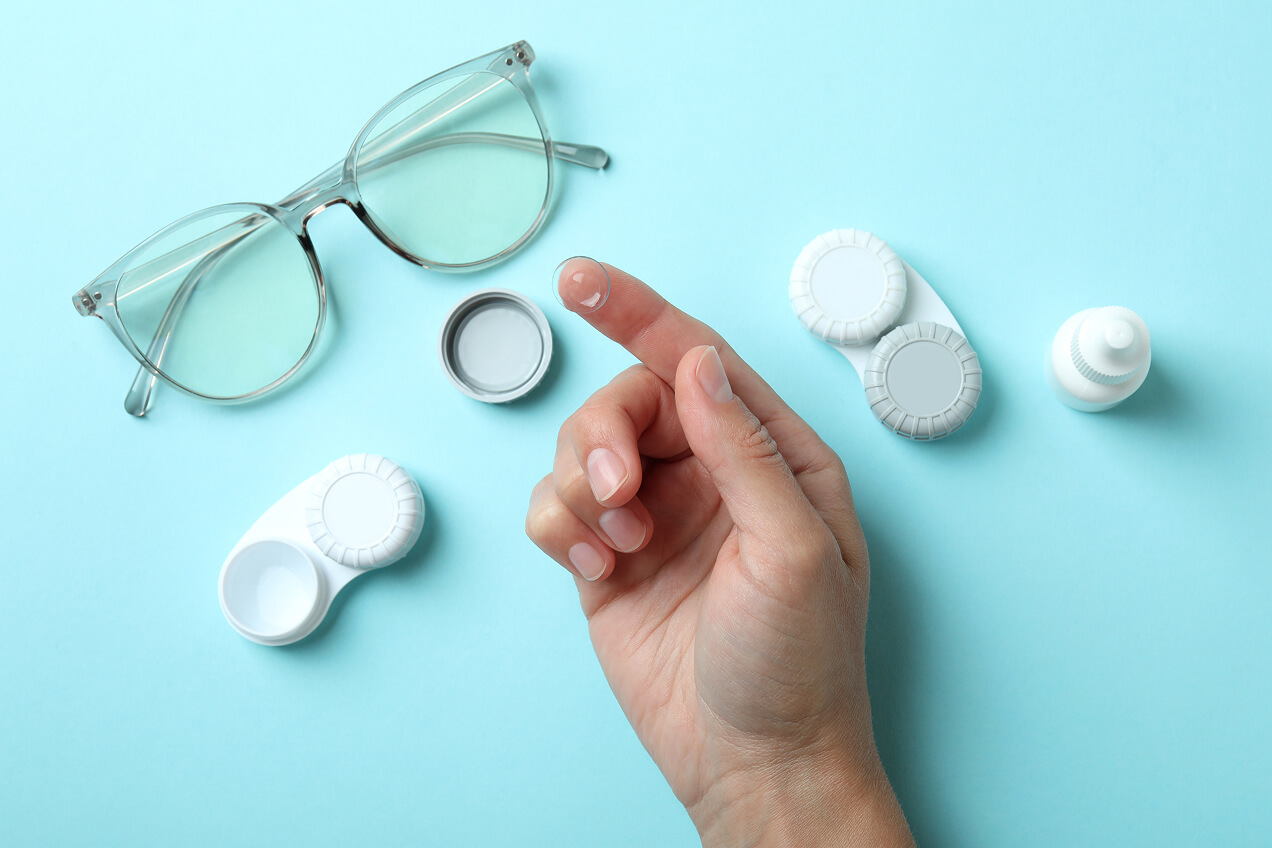
Are contacts right for you?
Reviewed by Dr. Wild
Contact lenses can be right for you if you have healthy eyes, an appropriate prescription, can maintain recommended hygiene care, and want flexibility beyond traditional glasses. Most people can successfully wear contacts with proper fitting and care. Good candidates are comfortable touching their eyes, committed to daily hygiene routines, and have stable eye health confirmed by an optometrist.
Book an eye exam
As Canada's largest eye care provider, FYidoctors determines your suitability through comprehensive eye exams – evaluating your prescription, tear quantity, and lifestyle needs. Contact lenses offer incredible freedom when properly fitted. Book an appointment to discover if contacts could enhance your family's vision care options.
Lifestyle considerations
Your daily activities play a huge role in determining whether contacts are a good fit. If you're active in sports, enjoy outdoor activities, or work in environments where glasses might be impractical, contact lenses could significantly improve your quality of life. They won't fog up in cold weather, slip during exercise, or limit your peripheral vision during activities.
For busy parents managing multiple schedules, contacts can offer the freedom to move seamlessly from work meetings to children's sports games without worrying about glasses getting in the way. Many of our patients find that contacts give them the confidence to be more active and engaged in their daily lives.
Eye health considerations
Not everyone is a candidate for contact lenses, and that's where professional assessment becomes crucial. Certain eye conditions, such as severe dry eyes, frequent eye infections, eyelid inflammation, or specific corneal irregularities, may make contact lens wear challenging or inadvisable.
During a comprehensive eye exam, our optometrists evaluate factors like your tear quantity, corneal shape, and overall eye health to determine if contacts are safe and comfortable for you. We also consider any medications you're taking that might affect your eyes' ability to tolerate contact lenses.

Personal habits and commitment
Successful contact lens wear demands consistent hygiene practices. Be sure to follow proper hygiene routines as directed during your contact lens fitting and replace lenses according to schedule. Sleeping in contacts, or using expired solutions can lead to serious eye infections.
Some people need time to adjust to insertion and removal, while others adapt quickly. Your optometrist can provide techniques to make the process easier and more comfortable.

Why professional fittings matter
A professional contact lens fitting goes far beyond simply determining your prescription strength. This comprehensive process ensures your lenses fit properly, feel comfortable, and maintain your eye health over time.
Comprehensive eye measurements
Your eye care professional measures multiple aspects of your eye's surface during a fitting. Corneal curvature, eye shape and size, and tear film quality all influence which lens materials and designs will work best for you. These measurements require specialized equipment that online retailers cannot provide.
Pupil size and eyelid position can affect lens selection too. Some people need larger or smaller diameter lenses based on their unique eye anatomy. Your optometrist also evaluates how your eyelids interact with potential lens options to prevent discomfort or lens displacement.
Material and design selection
Modern contact lenses come in numerous materials, each with different oxygen permeability, water content, and deposit resistance properties. Your eye care professional considers your tear chemistry, wearing schedule, and any sensitivities when recommending specific lens types.
Specialized designs address various vision needs. Toric lenses correct astigmatism, while multifocal options help with presbyopia. Some people benefit from hybrid lenses that combine different materials, or scleral lenses for irregular corneas. These advanced options require expert evaluation and fitting.
Safety and follow-up care
Professional fittings include education about proper lens care, insertion techniques, and warning signs of complications. Your optometrist establishes a follow-up schedule to monitor your eye health and lens performance over time.
Regular check-ups catch potential problems early, before they become serious. Changes in your eyes, prescription, or lifestyle may require lens adjustments or replacements. This ongoing relationship with your eye care provider protects your vision and ensures continued comfort.
Book a contact lens fitting

Contact lens vs. Glasses prescriptions: understanding the difference
Many people assume their glasses prescription automatically translates to contact lenses, but these are distinctly different measurements that account for how each correction method interacts with your eyes.
Distance and positioning factors
Glasses sit approximately 12 millimeters away from your eyes, while contact lenses rest directly on your tear film. This distance difference significantly affects the prescription strength needed for optimal vision correction. Higher prescriptions show more dramatic differences between glasses and contact lens powers.
The positioning also affects how light enters your eye. Glasses create a smaller effective field of vision due to frame limitations, while contacts move with your eye, providing consistent correction across your entire visual field. This difference requires specific calculations to ensure proper vision correction.
Prescription components
Contact lens prescriptions include additional specifications not found in glasses prescriptions. Base curve and diameter measurements ensure proper lens fit and movement on your eye. These parameters affect comfort, vision quality, and eye health.
For astigmatism correction, contact lens prescriptions specify axis orientation and cylinder power differently than glasses. The lens must maintain proper orientation on your eye, requiring careful consideration of your eyelid anatomy and blinking patterns.
Legal and safety requirements
In Canada, contact lens are considered medical devices and require professional fitting and monitoring. You cannot legally purchase contact lenses without a valid prescription from a licensed eye care professional, regardless of whether you're buying online or in-store.
This regulation exists because improperly fitted lenses can cause corneal abrasions, infections, or permanent vision damage. Even if you've worn contacts successfully for years, regular prescription updates ensure your lenses continue to fit properly as your eyes change over time.
Why choose FYidoctors for contact lens care
Fyidoctors provides comprehensive contact lens services that prioritize your eye health, comfort, and vision quality through personalized professional care you simply cannot receive from online retailers.
Comprehensive trial and follow-up
We provide trial lenses so you can experience different options before arriving at a final decision. Our team teaches proper insertion, removal, and care techniques, ensuring you feel confident managing your lenses independently. We schedule follow-up appointments to monitor your adaptation and address any concerns.
Our ongoing support includes regular check-ups to assess lens performance and eye health. As your needs change or new lens technologies become available, we help you transition to better options that enhance your vision and comfort.
Quality assurance and professional standards
Our optometrists stay current with the latest lens technologies and fitting techniques through continuing education, ensuring you receive the most advanced care available.
We maintain detailed records of your lens history, prescription changes, and eye health status. This comprehensive documentation enables better long-term care and helps identify patterns that might affect your lens success or eye health over time.
Book your visit
Making your decision
Contact lenses can significantly improve your quality of life when properly fitted and maintained. The key to success lies in professional evaluation, appropriate lens selection, and ongoing eye care support. Your vision deserves professional attention from qualified eye care providers who understand the complexities of contact lens fitting.
At FYidoctors, we combine clinical expertise with personalized service to help you achieve comfortable, clear vision that enhances your daily activities.
Ready to explore whether contact lenses are right for you? Book an appointment for an eye exam or find a location near you.


FAQs
1. Can I use my glasses prescription to buy contacts online?
No, contact lens prescriptions differ from glasses prescriptions and require professional fitting to ensure proper fit, comfort, and eye safety.
2. How often should I replace my contact lenses?
Replacement schedules vary by lens type - daily, weekly, bi-weekly, or monthly. Your optometrist will recommend the best schedule based on your eye health and lifestyle.
3. Are contacts safe for people with dry eyes?
Some people with dry eyes can wear contacts successfully with proper lens selection and care. A professional evaluation determines the best options for your condition.
4. What happens during a contact lens fitting appointment?
Your optometrist measures your eye shape, evaluates tear film quality, selects appropriate lenses, and a team member teaches proper insertion, removal, and care techniques.
5. Can I sleep in my contact lenses?
Only specific extended-wear lenses have been approved for overnight wear. However, wearing soft contact lenses overnight can increase your risk of eye infections by 20x.

Your Vision, Our Priority
Personalized eye care from FYidoctors, combining advanced lens technology with comprehensive exams by trusted Canadian optometrists.